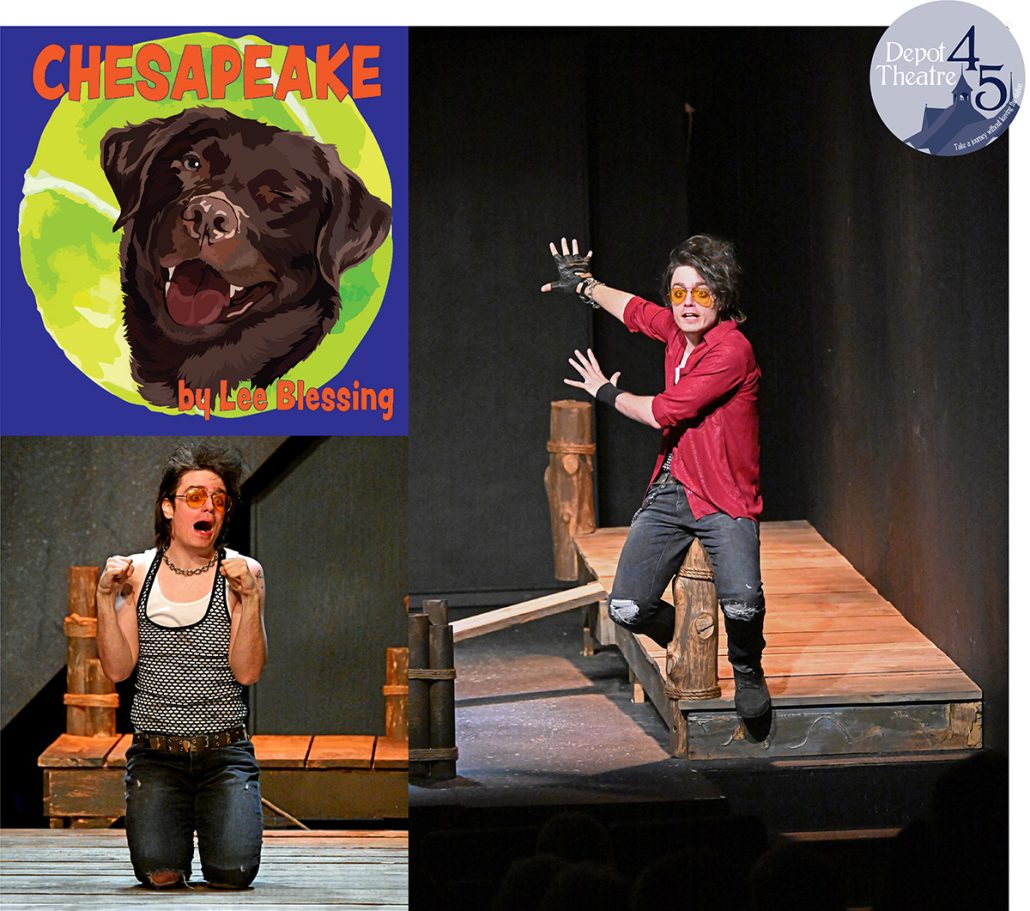What is art, anyway? Your dog knows.
Long before this thing called woke, long before we had come to understand that all the world’s problems could be solved with pronouns, there existed a simpler time in which culture-war villains had real brick-and-mortar office buildings with actual staff and budgets funded by hard-working, god-fearing taxpayers.
Back when Senators had names like Helms and Graham, nothing was more reviled than the National Endowment for the Arts (NEA), whose money (your money!) was funding artistic shows featuring excrement, burning flags, or human nether regions.
Annual NEA budget fights, predictable as a setting sun through the 1990s — and a lack of understanding of art in general — led playwright Lee Blessing to pen CHESAPEAKE, the story of an envelope-pushing performance artist, Kerr, a drawling southern Senator, Pooley, and a dog(s) — all played by a single actor.
CHESAPEAKE, which opened July 20 at the Depot Theatre in Westport, was written in 1999, but the Depot has found new relevance in it today, what with the national spate of book banning in school libraries. Thirty years ago Robert Mapplethorp was giving far-right activists a case of the vapors, and today it’s Nora Roberts. Somehow that doesn’t feel like progress.
Kerr, Pooley, Pooley’s domineering wife, his assistant, Lucky the dog, and several other characters are all played by Luke Wehner in a stage-filling performance that obviously requires a sort of superhuman versatility.
Sporting a shaggy, retriever-esque hairstyle, Wehner seamlessly toggles between angry young artist and pliant pup, then morphs into one of the three southern characters as effortlessly as you can say “down boy.”
With disparate voice and gesture, and some creative lighting, the production feels rich in character, or characters, despite its being a one-man band. The set — bayside piers with a signature Annapolis-styled sail as a backdrop — is equally versatile, serving as everything from waterman’s cabin to the Senate floor.
The performance moves smartly along, liberally scattered with humor and the overarching question of “what is art?” Good question.
Blessing’s script is somewhat one-dimensional, relying on the bromide that “failed art is better than no art at all” as a blank check, cover for bad artistic behavior. This, ironically, is the same stubborn thinking of which the political right is oft accused, when it excuses the inexcusable as “God’s will.”
With no opposing view presented, it feels as if Pooley gives up a little too easily when shown the error of his ways by a dog that has positioned himself as a messenger from God. Or it could be that Blessing is telling us there’s not that much difference between religion and art.
He is also prescient, as the battle over expression has moved from the U.S. Capitol to school boards that have bowed to angry activists demanding the banning of books they have not read.
As such, this is a play that has aged well. In the ’90s, activists were averting their eyes from Mapplethorpe in the same way today’s activists are making no effort to understand that which they deem unacceptable.
So, nearly a quarter century after CHESAPEAKE was written, you have to wonder: When was the last time you heard National Endowment for the Arts funding raised as a political issue?
Blessing’s intended point is that we need controversial or “failed” art to push the envelope, to make us feel things, good or bad, to clear a path into which good art is free to flow.
True as that may be, the fact that no politician has mentioned the NEA in years proves what might be Blessing’s most insightful conclusion: Politics itself has become performance art, a pursuit intended to raise emotions instead of solving problems. Unfortunately for us, the politicians seem to have learned from the artists all too well.
Tim Rowland contributed this review by the request of, and in collaboration with the Depot Theatre. Rowland is a journalist and New York Times bestselling author, whose humorous commentaries explore an eclectic variety of subject matter, from politics to history to the great outdoors. He and his wife Beth live on the Ausable River in Jay, N.Y.

